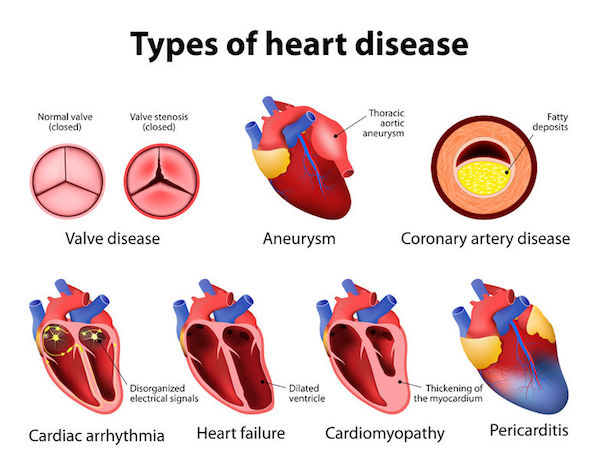Heart disease or cardiovascular disease (CVD) is an umbrella term for any disorder that affects the structure and functions of the heart and circulation.

This includes diseases of the arteries (coronary heart disease, or CHD), diseases of the heart muscle or diseases of the heart valves.
CVD has many root causes: for example, high blood pressure (hypertension) damages the heart muscle so it becomes too weak or stiff to effectively pump blood. You could also have a faulty heart valve or congenital heart defects (you were born with them).
The most common symptoms of coronary heart disease are chest pain and a heart attack. You can also experience other symptoms, such as heart palpitations and unusual breathlessness. However, in some cases, people may not have any symptoms before they are diagnosed.
Every hour in South Africa, five people have heart attacks, 10 people have strokes and 10 people die from heart disease and strokes, according to the Heart and Stroke Foundation South Africa.
What are its symptoms?
Heart failure symptoms vary, depending on what type of heart disease you have. However, they may have similar warning signs. These include:
- Shortness of breath, during effort and when lying at rest
- Palpitations (irregular heartbeats)
- A faster heartbeat
- Weakness or dizziness
- Nausea
- Sweating
- Fatigue and weakness
- Swelling in your legs, ankles and feet.
In the case of chronic coronary artery disease, be on the alert for the following symptoms and seek emergency treatment:
- Heavy pressure, tightness, crushing pain or unusual discomfort in the centre of the chest
- This may feel like indigestion, spread to your shoulders, arms, neck or jaw and/or last for more than 15 minutes. It may stop or weaken and then return
- You may experience a rapid, weak pulse
- Severe weakness
- Sudden shortness of breath
- Coughing up of foamy, pink mucous.
How is it diagnosed?
To make a heart disease diagnosis, your doctor will take note of your medical and family histories and your risk factors, for example, if you’re diabetic, this increases your risk of high blood pressure and coronary heart disease. They will conduct a physical exam and consider your results from a myriad tests and procedures.
No single test can diagnose heart disease. There are a number of different ones, depending on what condition your doctor thinks you might have. These include:
- An electrocardiogram (ECG)
- Exercise stress tests
- X-rays
- Echocardiogram
- Blood tests
- Coronary angiography
- Radionuclide tests
- And MRI (magnetic resonance imaging) scans.
Heart disease treatment is easier with early detection, so talk to your doctor about your concerns.
What are your treatment options?
Treatment options depend on the type, cause, symptoms and severity of the identified heart disease. They can include anything from a range of drugs to major surgery. For instance, if you have an infection in one of the heart valves, you’ll probably be prescribed antibiotics.
Generally, treatment for heart disease includes:
- Lifestyle changes: These include eating a low-fat and low-sodium diet, getting at least 30 minutes of moderate exercise on most days of the week, quitting smoking, and limiting alcohol intake.
- Medication: If lifestyle changes alone aren't enough, your doctor may prescribe medications like beta blockers to control your heart disease. The type of medication will depend on the type of heart disease and usually include a combination of medications.
- Specific procedures or surgery: This will depend on the type of heart disease and the extent of the damage to your heart. They can include bypass surgery, heart valve repair or a heart transplant, or devices such as a pacemaker.
Can it be prevented?
Heart disease is preventable and manageable. Although you cannot change some risk factors, such as family history, there are some key prevention steps you can take.
By switching to a healthy lifestyle, you can avoid heart problems in the future. Eliminate stress from your life as much as possible, follow a healthy diet and get regular exercise, maintain a healthy weight, get enough sleep, go for regular health screenings, and ‘know your numbers’, that is, your blood pressure, sugar and cholesterol levels.
What to do now
Clicks Clinics will help you ‘know your numbers’ with their wide range of screening tests. These include:
- Blood Pressure (BP) Test
- Cholesterol Testing and Consultation
- Lipogram Blood Test (to determine different types of cholesterol)
- Clicks Full Basic Screening (BP, Body Mass Index or BMI, meal guide and exercise plan)
- Clicks Screening Measurements only (BP and BMI)
- Clicks Comprehensive Screening (BP, BMI, Glucose and Cholesterol screening, plus meal and exercise plan).
To make an appointment at a Clicks Clinic, call 0860 254 257 or visit Clicks Clinics online.
For more info
The Heart and Stroke Foundation South Africa
IMAGE CREDIT: 123rf.com
